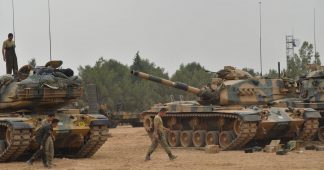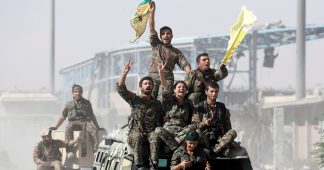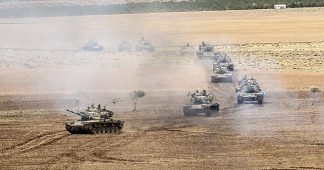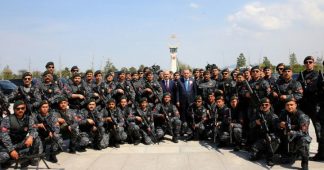By Barış Demir
8 November 2018
As it pursues its war with US-backed Kurdish-nationalist organizations, the Turkish government is threatening an outright military occupation of large parts of Syria that could provoke war with Syria and a direct clash with US forces.
On Tuesday, Turkish President Recep Tayyip Erdogan denounced joint patrols by US forces and Kurdish-led militias as “unacceptable.” Speaking to reporters in Ankara, he said: “Not only can we not accept (the joint patrols), such a development will cause serious problems at the border.”
This came after Turkey shelled positions of the US-backed Syrian Democratic Forces (SDF) in the Zor Magar region east of the Euphrates River and the town of Tal Abyad starting on October 28, killing at least 10 Kurdish fighters. Two days earlier, Erdogan had delivered a “final warning” to Syrian Kurdish fighters to retreat. He also warned that Turkey’s next target would be positions of the People’s Protection Units (YPG, a Kurdish force that is the key component of the SDF) east of the Euphrates.
On October 30, as shelling continued, Erdogan stepped up threats to invade Syria to attack the US-backed Kurdish forces: “We are going to destroy the terrorist organization… preparations and plans have been completed. We’ve made our plans and programs, and initiated it in the previous days. We will come down on the terrorist organization’s neck with more extensive, effective operations. We could arrive suddenly one night.”
This provoked an angry warning from Washington on October 31. State Department deputy spokesman Robert Palladino said: “Unilateral military strikes into northwest Syria by any party, particularly as American personnel may be present or in the vicinity, are of great concern to us … Coordination and consultation between the United States and Turkey on issues of security concern is a better approach.”
Ankara, however, is determined to crush the YPG, which it views as an affiliate of the Kurdistan Workers’ Party (PKK), the Turkish Kurdish separatist movement against which it has waged a bloody counter insurgency campaign for more than 30 years. Ankara also fears Kurdish autonomy in Syria, worried it will provoke demands for Kurdish autonomy in eastern Turkey.
In an apparent attempt to placate Ankara, Washington announced on Tuesday that it would place bounties on the heads of three PKK leaders. Visiting Turkey, Deputy Assistant Secretary of State Matthew Palmer announced that the State Department’s Rewards for Justice program is offering money for information leading to the capture of the PKK officials. The bounties are $5 million for Murat Karayilan, $4 million for Cemil Bayik and $3 million for Duran Kalkan.
But Ambassador James Jeffrey, the US special representative for Syria engagement, said Washington did not see the YPG and PKK as the same entity. He declared: “For us, the PKK is a terrorist organization. We are not of the same opinion on the YPG. We ensure that the YPG operates as part of the Syrian Democratic Forces in the fight against the Islamic State in Iraq and the Levant [ISIL] in a way that does not pose a threat to Turkey.”
Turkish presidential spokesperson Ibrahim Kalin rebuffed the US initiative, saying Ankara would treat it “with caution” and demanding that Washington sever all ties with the YPG.
Turkey’s ever-deeper involvement in the bloodshed across the region is the product of Erdogan’s decision to support the proxy war for regime change launched by the NATO imperialist powers in Syria in 2011.
As the WSWS previously noted: “All Erdogan’s calculations were upended by the intensification of the war and of the class struggle in the Middle East. In 2013, amid growing working class anger against Egypt’s Islamist President Mohammad Mursi and social protests in Turkey centred in Gezi Park, the imperialist powers backed an army coup that toppled Mursi. As the Islamic State (IS) militia grew in Syria and invaded Iraq, moreover, they turned to the use of Kurdish nationalist groups as their proxies against IS.
“Erdogan could not adapt himself to these sudden, violent shifts in imperialist war policy, and Ankara’s imperialist allies rapidly came to see him not as a ‘strategic partner,’ but as an unreliable one.”
After Russia intervened militarily to prevent NATO-backed Islamist militias from overthrowing Syrian President Bashar al-Assad, Turkish jets shot down a Russian jet over Syria in November 2015, with US support. After Russia escalated its military posture in response and threatened economic sanctions in retaliation against Turkey, however, Ankara tacked back toward Russia and China. Ankara turned first to China and then Russia for an air defence system, while its relations with the Obama administration and its European allies rapidly deteriorated.
In July 2016, a section of Turkey’s military, encouraged by Washington and Berlin, launched an abortive putsch out of NATO’s Incirlik air base, aiming to murder Erdogan and carry out regime change in Turkey.
Erdogan responded to the coup by stepping up the war against the Kurds and imposing a state of emergency, seeking to strangle all political opposition. Ankara also maneuvered closer to Moscow and Tehran, setting up talks in Astana for a “solution” to the Syria war. And Erdogan ordered the Turkish army to launch its own invasions of Syria, “Operation Euphrates Shield” (in August 2016) and “Operation Olive Branch” (in January 2018), directed against the YPG.
The brief warming of US-Turkish relations that followed the gruesome state murder on October 2 of Saudi journalist Jamal Khashoggi in the Saudi consulate in Istanbul appears to have quickly ended. Ankara clearly saw the investigation of the Khashoggi assassination as a means of promoting Turkish interests in relation to Riyadh and Washington. It had shared tense relations with both the Saudi regime and US imperialism, including over the Saudi blockade of Qatar, a key Turkish ally, and the US alliance with the YPG in Syria.
Erdogan sought to improve relations with Washington by investigating the killing of Khashoggi, who worked extensively for US publications, including the Washington Post. Ankara also released US pastor Andrew Brunson, whom it had accused of helping prepare the 2016 coup. But Washington soon dropped the Khashoggi murder, focusing instead on strategies for intensifying the war in Syria.
Ankara is responding by moving closer to the European powers and seeking to exploit their growing differences with Washington. It joined a new mechanism with Germany, France and Russia to work out a peace deal in Syria acceptable to the European imperialist powers. An inconclusive October 27 Istanbul summit on Syria, hosted by Erdogan, was attended by German Chancellor Angela Merkel, French President Emmanuel Macron and Russia President Vladimir Putin.
After the summit, they called for a new Syrian constitution to be drafted before the end of this year, “paving the way for free and fair elections,” according to a joint statement.
Visiting Tokyo on Tuesday, Turkish Foreign Minister Mevlüt Çavuşoğlu also criticized US sanctions against Iran, which have been the subject of escalating conflict between Washington and the European powers. “While we were asking (for) an exemption from the United States, we have also been very frank with them that cornering Iran is not wise,” he said. “Turkey is against sanctions, we don’t believe any results can be achieved through the sanctions.”











